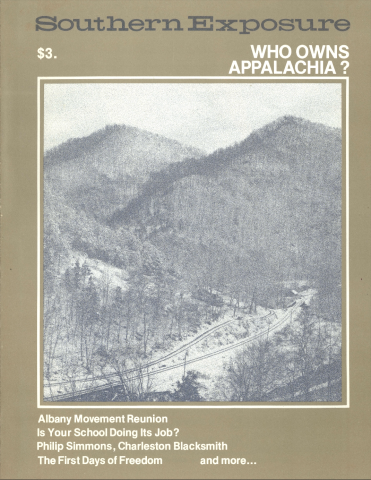Human Rights: A Cry for Freedom

This article originally appeared in Southern Exposure Vol. 10 No. 1, "Who Owns Appalachia?" Find more from that issue here.
All 22 million Afro-Americans have the same basic goal, the same basic objective. We want freedom, justice and equality, we want recognition and respect as human beings. We are not divided over objectives, but we have allowed our racist enemies to divide us over the methods of attaining these common objectives. Our enemy has magnified our minor points of difference, then maneuvered us into wasting our time debating and fighting each other over insignificant and irrelevant issues.
The common goal of 22 million Afro-Americans is respect as human beings, the God-given right to be a human being. Our common goal is to obtain the human rights that America has been denying us. We can never get civil rights in America until our human rights are first restored. We will never be recognized as citizens there until we are first recognized as humans.
The present American “system” can never produce freedom for the black man. A chicken cannot lay a duck egg because the chicken’s “system” is not designed or equipped to produce a duck egg. The American “system” (political, economic and social) was produced from the enslavement of the black man, and this present “system” is capable only of perpetuating that enslavement. In order for a chicken to produce a duck egg, its system would have to undergo a drastic and painful revolutionary change ... or REVOLUTION. So be it with America’s enslaving system.
In the past the civil-rights groups in America have been foolishly attempting to obtain constitutional rights from the same Government that has conspired against us to deny our people these rights. Only a world body (a world court) can be instrumental in obtaining those rights which belong to a human being by dint of his being a member of the human family.
As long as the freedom struggle of the 22 million Afro- Americans is labeled a civil-rights issue it remains a domestic problem under the jurisdiction of the United States and as such bars the intervention and support of our brothers and sisters in Africa, Asia, Latin America, as well as that of the well-meaning whites of Europe. But once our struggle is lifted from the confining civil-rights label to the level of human rights, our freedom struggle has then become internationalized.
Just as the violation of human rights of our brothers and sisters in South Africa and Angola is an international issue and has brought the racists of South Africa and Portugal under attack from all other independent governments at the United Nations, once the miserable plight of the 22 million Afro-Americans is also lifted to the level of human rights, our struggle then becomes an international issue and the direct concern of all other civilized governments. We can then take the racist American Government before the World Court and have the racists in it exposed and condemned as the criminals that they are.
Why should it be necessary to go before a world court in order to solve America’s race problem? One hundred years ago a civil war was fought supposedly to free us from the Southern racists. We are still the victims of their racism. Lincoln’s Emancipation Proclamation was supposedly to free us. We are still crying for freedom. The politicians fought for amendments to the Constitution supposedly to make us first-class citizens. We are still second-class citizens.
In 1954, the U.S. Supreme Court itself issued a historic decision outlawing the segregated school system, and 10 years have passed and this law is yet to be enforced even in the Northern states.
If white America doesn’t think the Afro-American, especially the upcoming generations, is capable of adopting the guerrilla tactics now being used by oppressed people elsewhere on this earth, she is making a drastic mistake. She is underestimating the force that can do her the most harm.
A real honest effort to remove the just grievances of the 22 million Afro-Americans must be made immediately or in a short time it will be too late.
Tags
Malcolm X
El Hajj Malik Shabazz (Malcolm X), one of the most influential people ever to speak out on the subject ofAfro- American liberation, wrote this for the Egyptian Gazette of August 25, 1964. It is reprinted from Malcolm X, the Man and His Times, edited by John Henrik Clarke (Collier Books, 1969), with the permission of the editor. February is Afro-American history month and the sixteenth anniversary of Malcolm’s assassination. (1982)